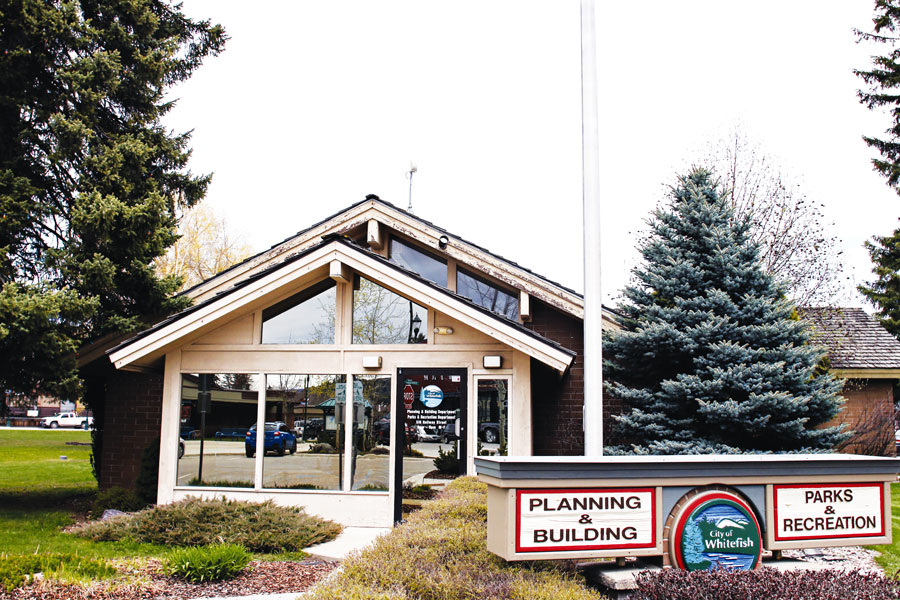The Whitefish City Council on Monday refused to veer from its plan to demolish the former city parks and planning building in Depot Park, despite mounting pressure from members of the Chamber of Commerce to lease the property as a visitor center.
Following a lengthy meeting that featured nearly an hour of public testimony centered on the building’s fate, council quashed an 11th-hour campaign to halt demolition when a motion failed to even reach a vote.
The motion to reconsider the structure’s fate by council member Katie Williams — meant to serve as a measuring stick of her colleagues’ bearing — required a second before council could so much as vote to add the item to its next agenda. Following a long silence that spoke volumes about the council’s temperament, Mayor John Muhlfeld declared the motion’s failure, and summed up the council’s position, directly addressing the chamber’s executive director Kevin Gartland.
“We have been here before, Kevin. I hope you can appreciate the city’s position on this,” Muhlfeld said. “Please let the Chamber know that we respect their point of view on this. Obviously, we feel a bit differently and are moving forward as adopted in our Downtown Master Plan and the adopted Depot Park Master Plan. I know it’s not what you were hoping for tonight, but it is what it is.”
Indeed, the debate over whether or not to repurpose the building has been the subject of numerous public hearings and open houses through the years.
Demolition of the building, located in the southwest corner of the park, is the course of action called for in the Depot Park Master Plan, and city council reaffirmed its recommendation to remove the building in a 4-3 vote in July 2016. In that same vote, the council also decided the city should accept proposals from groups interested in leasing the space for a five-year term, agreeing that the city will accept applications for the next four months, after which it could reconsider its decision to permanently remove the building.
When the chamber returned to the city later that fall with a request for a 10-year lease on the building, council turned down the plan, arguing that adding green space to the park held more value than holding on to the building.
Saving the building gained a renewed sense of urgency recently when Chamber Board Chairman Dan Graves wrote a letter to the city, reviving the chamber’s request to spare the building.
“We believe the building to be a valuable asset to the city, and — potentially — a tremendous benefit to those who visit our town and the tourist-based economy that thrives because of them,” Graves, the CEO of Whitefish Mountain Resort, wrote. “We understand that the council has considered — and denied — this proposal in the past. Since that time, however, the estimated cost of demolishing the structure has more than quadrupled. We feel that’s a significant enough reason to merit reconsideration of this issue, in the interest of fiscal common sense.”
Graves said the original estimate to demolish the building hovered around $20,000 before rising exponentially to $120,000. The chamber’s proposal to lease the building from the city for 10 years, by contrast, would add $360,000 in rent to its coffers.
Replying in a separate letter, Muhlfeld acknowledged that demolition costs had increased, but noted the higher price tag was due to the project increasing in scope. The initial estimate only accounted for the building’s demolition, and didn’t include the costs of asbestos remediation, improving utilities, reclamation of the land to a useable green space, or other improvements.
Muhlfeld said the cost increase will not place an additional burden on taxpayers as the building demolition and other added improvements are within the approved budget for fiscal year 2018 and will be paid for with Tax Increment Funds (TIF) attached to the Depot Park Master Plan.
He also emphasized that the building’s future was the subject of a multi-tiered public process.
“We also recognize there are people in the community which would prefer one direction over another. This is why we have a thorough public process that includes public hearings for most items at the both the planning board and city council, exceeding what is required by state statute,” Muhlfeld wrote. “This process provides an avenue for all to voice their opinions and concerns during the decision-making process. I assure you that all opinions were heard and valued, not once but multiple times on this issue.”
The city purchased Depot Park in 2008-09 for $3.8 million in two transactions using tax-increment fund revenue, while the Depot Park Master Plan set forth a blueprint for the area that called for the building’s demolition in order to remove an impediment blocking an artery between Whitefish’s downtown corridor and the park.
Rhonda Fitzgerald, owner of the Garden Wall Inn in downtown Whitefish and a member of the Montana Tourism Advisory Council, said the building’s time in Depot Park had run its course.
“That building is squatting on the front door of that park, and we were assured that the building would go away,” Fitzgerald, who served on the original Downtown Master Plan Committee, said. “It is time now for that building to go away. The building needs to go so that the city’s investment in that property can come to fruition and provide the vibrancy that was envisioned.”
Fitzgerald added that brick-and-mortar visitor centers have become increasingly passé as visitors increasingly rely on mobile devices and apps to navigate restaurants and activities in Whitefish.
Other alternative uses for the building included selling it to the North Valley Music School, but in the end the nonprofit could not come up with the asking price.
